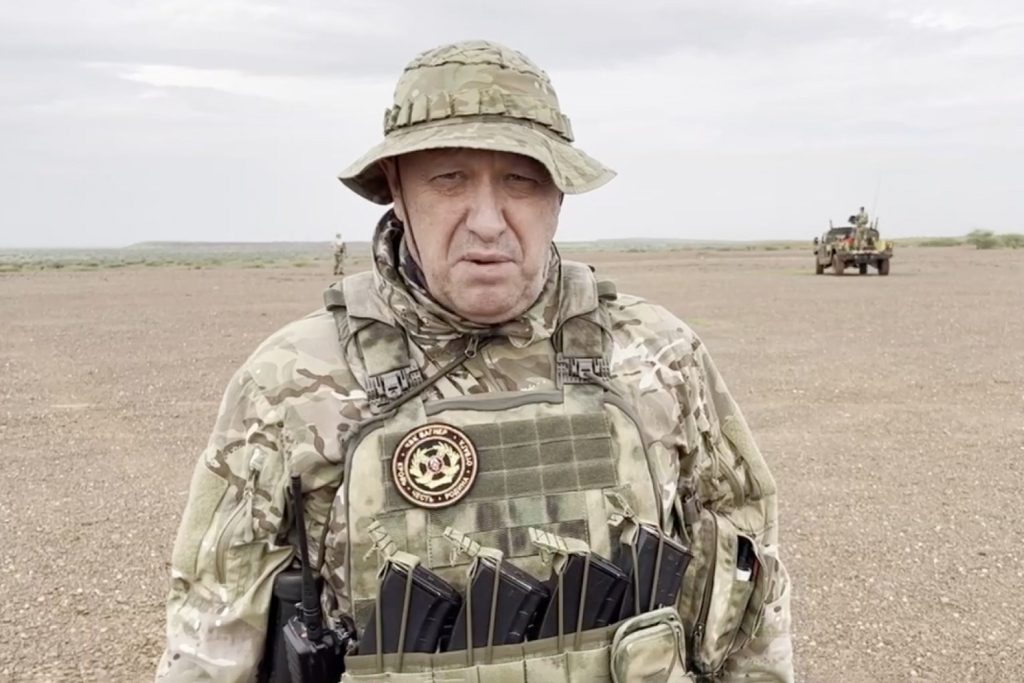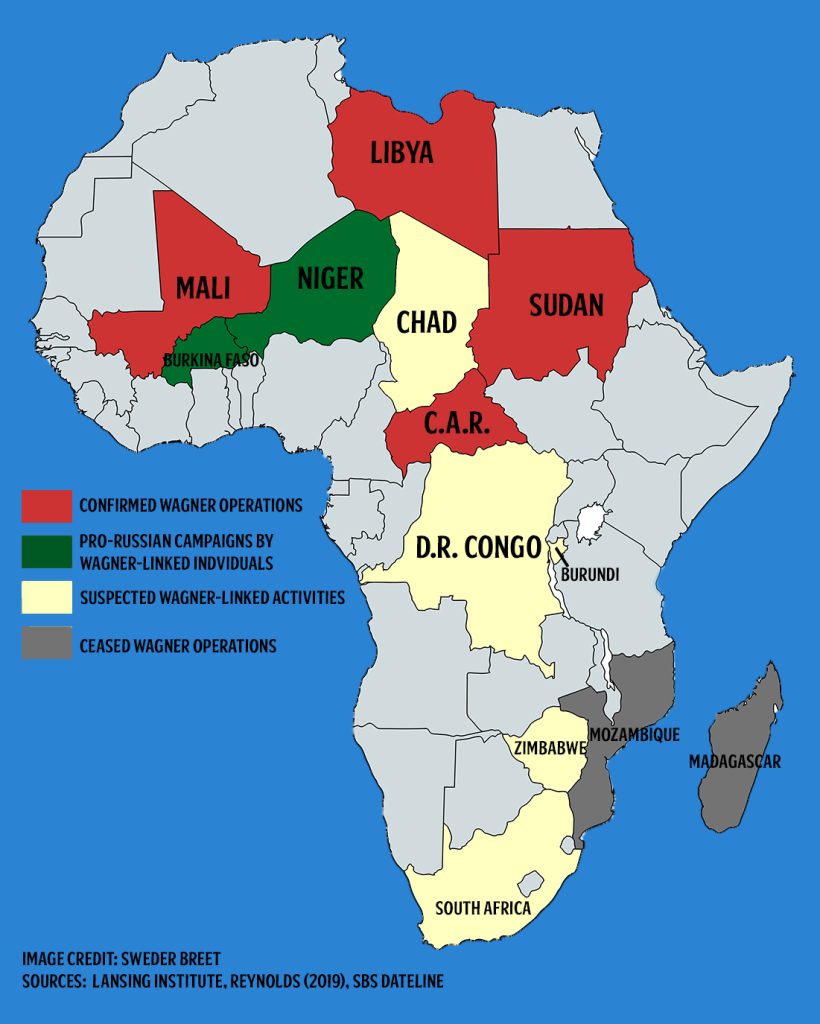
“Justice and Happiness to African People” – The Wagner Group’s Involvement in African Security
The private military company Wagner Group has gained significant popularity in Africa due to its involvement in local conflicts, which raises questions about the agency of sovereign states during times of crisis.
“Making Russia greater on all continents and bringing justice and happiness to African people” – are some of the last publically stated words by former Russian Wagner Group leader Yevgeniy Prigozhin before his presumed death in August 2023, issued from a supposed Wagner Group base in Mali. The Wagner group, although mostly known currently for its involvement in the Russian invasion of Ukraine and its failed coup against the Russian government in July 2023, has had a significant number of operations on the African continent since 2017. Some of the countries in which the Wagner Group operates are Sudan, the Central African Republic (CAR), Libya, Mozambique, Madagascar and Mali, with suspicions of Wagner activities in Burkina Faso and Chad as well among others (Pokalova, 2023). These activities raise about why the Wagner Group, a paramilitary organisation and private military company, is involved in local conflicts there and in whose interest they are providing their services.

Yevgeniy Prigozhin (1967-2023, presumed) in his last public video. Unspecified location in Africa, 21 August 2023. Source: Telegram
The Wagner Group first started operating in Africa in 2017, although exact dates are unknown. The group provided military training for Sudanese forces and likely provided security for gold mines which were being exploited by a Russian company called M-invest after they signed a contract for the extraction of gold with Sudanese president Omar al-Bashir. This company is also linked to a catering company owned by Prigozhin and the two companies even share some management staff (Marten, 2018). After al-Bashir’s fall, Wagner supported General Hamdan’s claim for power in Sudan and provided weapons to his group as well as using the country to transport their own supplies and weapons into the Central African Republic starting as of 2018 (Asgarov, 2021). The group has been active in the CAR for similar reasons as in Sudan, as the Russian government struck a deal with the government of the country for the extraction of gold and diamonds by companies linked to Prigozhin (Reynolds, 2019). Although these operations do not have a significant impact on the Russian economy, they are likely to be seen as a way to pay for Prigozhin’s operations in Africa and to reinforce Russian foreign policy, following the Russian idea of Russkiy Mir – Russian Peace or Russian World depending on how the translation can be interpreted. Similar events happened in Mali in 2021, where Wagner forces started to gain a presence after France announced its retreat from the country following a political fallout with Mali’s new government after a coup (Pokalova, 2023).
A Political Tool
The role and activities of Wagner can be explained when looking at the political stance of Russia and the countries in which Wagner operates. Wagner predominantly operates in countries which have an anti-Western stance in the political arena or supports armed groups which oppose their pro-democracy government in Africa while working to get these people closer to Moscow (Asgarov, 2021). Many within the field of international security consider Wagner to be semi-state security forces, due to Prigozhin’s close links with Putin prior to his attempted coup and presumed death shortly thereafter. This allows the Russian government to influence the countries in which Wagner operates while still keeping plausible deniability over its involvement in foreign politics since the group is not officially linked to the Kremlin (Asgarov, 2021).
Additionally, individuals linked to the Wagner Group have appeared in other African countries such as Burundi, Zimbabwe and South Africa as well as the Democratic Republic of Congo. It is speculated that the deployment of Wagner to these countries is in an effort to expand their sphere of influence (Reynolds, 2019). Yet, these deployments are also good examples of Russia’s hard power, albeit indirect, by ensuring that the local “strong men” favour Russia thanks to Wagner soldiers training their soldiers and providing security, weapons and support. At the same time, questions can be asked about the agency of these groups and political leaders in making their own decisions when they are, for a large part, dependent on Wagner to maintain their power.

Of course, all the points brought up in this article are seen from a Western point of view and the group has therefore been seen as generally unfavourable due to their activities in pushing regimes away from the Western sphere of influence. Whether or not these regimes should approach themselves to the West, move closer to Russia or pursue an entirely different direction is not up to the author to decide However, I would argue that Wagner’s involvement in Africa is a new form of colonialism by indirectly allowing Russia to control who has the monopoly of violence in a country, thus taking away a state’s agency and sovereignty and making these states dependent on Russia to maintain their power while Russian “businesses” take control over the natural resources. As Velbab-Brown (2023) states, “besides making money from mining, timber extraction, and a beer company, Wagner advisors have developed vast influence over the CAR state, furthering Wagner and Russian interests at the expense of the public good”. This is also the case for General Hamdan’s forces, who heavily rely on Wagner’s intelligence and support to maintain authority in Sudan.
An Unclear Future
In conclusion, the Wagner Group can be seen as a tool for the Russian government to get African countries within their sphere of influence while still maintaining plausible deniability over their actions on the continent. In the countries where the group operates, it holds vast amounts of natural resources and political influence, allowing a steady stream of funds and control over their areas of operation. Therefore, it should be brought into question whether or not the countries in which the group operate and the regimes for which the group works truly have a say over their own decisions or whether or not Wagner, and by extent, the Kremlin, are the ones pulling the strings. With a so-called ally which uses a language where the words for “peace” and “world” (implying control as well) are one and the same, it should be asked if Russian groups are there to actually provide these countries with the help that they claim.
With the death of Prigozhin and other key figures in Wagner’s chain of command in August 2023, the future of the group remains unclear. However, Russia’s influence in Africa through Wagner’s remains or similar groups is very likely to stay.
References:
Adm1n. (2023, February 1). Wagner Group expands influence in DRC, Africa – Robert Lansing Institute. Robert Lansing Institute. https://lansinginstitute.org/2023/01/13/wagner-group-expands-influence-in-drc-africa/
Asgarov, R. Private Military Company in the Russian Manner: the Wagner Group and
Business on the Blood in the Central African Republic.
Marten, K. (2019). Russia’s use of semi-state security forces: the case of the Wagner Group. Post-Soviet Affairs, 35(3), 181–204. https://doi.org/10.1080/1060586x.2019.1591142
Mondeaux, C. (2023, June 26). Washington Examiner. Washington Examiner. https://www.washingtonexaminer.com/policy/defense-national-security/what-to-know-about-wagner-rebellion-against-russia
Pokalova, E. (2023). The Wagner Group in Africa: Russia’s Quasi-State Agent of Influence. Studies in Conflict & Terrorism, 1–23. https://doi.org/10.1080/1057610x.2023.2231642
Reynolds, N. (2019). Putin’s Not-so-secret Mercenaries: Patronage, Geopolitics, and the Wagner Group (Vol. 8). Washington, DC: Carnegie Endowment for International Peace.
What’s ahead for the Wagner Group in Africa and the Middle East? | Brookings. (2023, July 18). Brookings. https://www.brookings.edu/articles/whats-ahead-for-the-wagner-group-in-africa-and-the-middle-east/
Leave a comment
You must be logged in to post a comment.